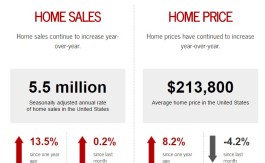When is Disclosure too Little, too Much or Just Right?
Real estate agents walk a fine line regarding disclosure in meeting their fiduciary responsibility to their clients. The question is when is disclosure too little, too much or just right? The truth is that there are no absolute answers, just common sense practices that an agent can follow to best serve their client and protect themselves.
We recently took a look at the C.L.U.E. report which has been available for approximately the last 8 or 9 years. Re-Insider finds this report to be a great example of the variety of information that can find its way into today’s real estate transactions.
The first question that should always be looked at when vetting disclosure information is, is there a legal requirement in the California Civil Code for a particular disclosure of information? If there is, for example the NHDS or TDS in most residential transfers, then it has to be in the disclosure information to the buyer.
But what about non legally required reports, C.L.U.E. being a good example? In the case of C.L.U.E. reports being provided, this grew simply from CAR adding a question to their SSD form which was then incorporated into the SPQ on page one. This is a form that has grown over the years to 10 questions in which a seller is advised, by CAR, to disclose to a prospective buyer of their residential property. The question on the CAR SPQ regarding insurance claims is simply “Insurance claims affecting the property in the last five years”— answer to be given as simply yes or no.
So how did the additional information contained in a C.L.U.E. report, not requested or required, come into use and does it potentially pose a liability to the agent? The quick answer to the first question for coming into use is money. What was once a simple yes or no answer from the seller is now a $19 + report that companies make money selling into the transaction.
As far as the question of liability to the agent, if the additional information in the C.L.U.E. report has a mistake in it, as happens from time to time and causes some of the problems discussed in the previous article, then who takes responsibility? The most common response from agents is the company that sold the report to me of course. But as it turns out this is not necessarily the case.
Why you ask? The C.L.U.E. report comes with no guarantee or indemnification from LexisNexus, the company that produces the report. The resellers, usually disclosure companies, all have a third party exclusion in their limits of liability that state they are not responsible for mistakes in information provided to them from outside sources.
This can leave the real estate agent or brokerage financially responsible for the C.L.U.E. report if there is a problem. The message in this for agents, using C.L.U.E. reports in this case, is to look at your disclosure procedures with an eye towards not only meeting your fiduciary duties to your clients, but managing your own risk. With that in mind, with the case of C.L.U.E. reports the best answer may be to use the CAR SSD form.
What do you think of this situation? Are you in favor of regulating disclosure companies?
RE Insider read more here:
http://re-insider.com/2014/07/23/when-is-disclosure-too-little-too-much-or-just-right/







